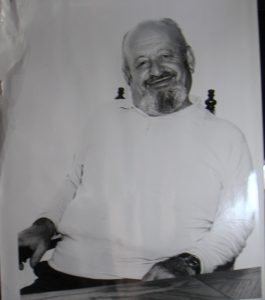In the picture, my grandfather sits
on a wood chair, leaning back,
the paunch of sixty-three years
preceding him in the foreground
smiling, lip curled
in the narrow space
between mustache and beard
nose sloping downward
olive skin
body compact, heavy.
Add a kefieh to his balding head
and he’s a grandfather of the Nakba,
Arafat’s twin.
But Benjamin Blumin was a Jew—
his own dispersion far-flung and final
nameless forbears fanning out through Europe
to land in shtetls at the gates of Minsk
where he watched Jewish men
get hanged from trees.
His mother disappeared
from consumption, his sister from starvation.
Cornered by catastrophe
he crossed an ocean
to Staten Island.
And there he said the best thing
was he could hit back if assaulted
by a Christian, without going to jail.
The best thing was white bread,
electricity, a hearing aid.
He said the worst thing
was that Black men
could not get jobs
could not hit back if assaulted
by a white.
He braved the ire of the plumbers’ union
hiring Black men, helping them
with licenses, guaranteeing their loans.
This is what catastrophe
taught my grandfather,
what pogroms and malnutrition
led him to do.
This was his small
uprising.
But my grandfather hardly ever
said a word.
Almost deaf since birth, his world
was thick and silent. He spoke
Yiddish and English, but
rarely.
So if we take him, sitting silently
on his wooden chair,
put the kefieh on his head
and move him
from the sands of Florida
to Gaza,
if he never opens his mouth
to let language differentiate
what the complexion of his skin
cannot,
who could he hit back, if assaulted,
without going to jail?
Could he have bread, electricity?
What kind of uprising
would he choose, my grandfather,
if left there
without a job
near a very long fence
stomach empty, unable to hear
waiting for someone
to determine his place?
And who
exactly
would determine
his place?
A number of years ago, I spent a weekend in Washington, D.C. at a conference and lobbying event put on by the US Campaign for Palestinian Rights (USCPR). I roomed with a Palestinian American woman my age, and we stayed up late into the nights comparing notes on our families and upbringings. We were astounded at how similar everything was, the language, traditions, superstitions, familial relations, humor, expressiveness. “Could any two peoples be more similar than ours?” we said.

Michelle Lerner is a second-generation Jewish American living in NJ. She’s a public interest lawyer, poet, fiction writer, and supporter of Palestinian rights.

